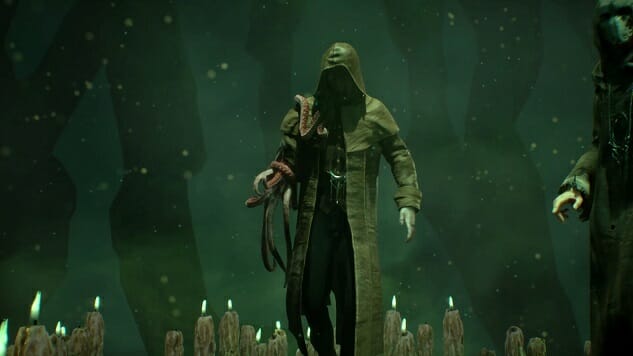Call of Cthulhu Isn’t Quite an Abomination, But It Is Pretty Damn Eldritch
Games Reviews Call of Cthulhu
Call of Cthulhu is a throwback in more ways than one. Made by Cyanide Studios (Styx, Space Hulk: Deathwing) and published by Focus Home Interactive, it feels like a game from another era: a callback to the lower-budget action adventure games of the early 2000s. And that’s not altogether a bad thing, as Call of Cthulhu is a pretty engaging horror for its rather brisk runtime, stringing together a murder mystery with an expected dash of Lovecraftian elements, only mired by its occasional stabs at more action-focused gameplay.
Cyanide had a lot to live up to with this title, as it’s not just based on Lovecraft mythos but specifically on the 1981 tabletop role-playing game of the same name. I’m not familiar with the tabletop game, but I did play a bit of Arkham Horror, and at this point the general Lovecraft mythos is enough in the cultural zeitgeist that many of the locations and themes of Call of Cthulhu felt familiar enough.
You play as Edward Pierce, who fits the mold of a stereotypical Lovecraft protagonist. He has a long coat, dark hair, dark eyes, and a certain penchant for liquor. He’s a detective, but one so traumatized by his experiences in World War I that it’s been hard for him to take cases, preferring to self-medicate with whiskey and sleeping pills in his office. He is tasked with solving the murder of the Hawkins family, and specifically of Sarah Hawkins, mother to Simon Hawkins and a renowned painter in her own right.
The game is a first-person, mostly role-playing game with a few sections focused on some clunky stealth and one truly abysmal first-person-shooter sequence. Luckily, these are few and far between, and the majority of the game involves walking around, talking to the various denizens of Darkwater Island. There are multiple endings, at least two of which revolve around choices made in the story, but the signaling of “what matters” in story decisions is vague.

Call of Cthulhu has the pacing of an adventure game but very little of the grace of one. Puzzle sections are generally short and none gave me significant trouble—they’re mostly linear affairs of finding which gear turns which crank to raise the rope to get the ladder to find the key kind of affairs. They’re not unenjoyable, and the game’s moody atmosphere and gloomy charm kept me plenty interested even if the brain-teasers were never particularly puzzling.
The other central tenet of the game are its role-playing elements, which feel bizarrely under-explained and confusing in their application. When the game begins, you are introduced to a simple web of upgradeable abilities, some of which you could spend character points on (earned throughout gameplay) and some of which could only be upgraded through finding collectible objects in the environment.
One of these character-point-upgradeable abilities is an ability to spot hidden objects, which, as far I understand it, makes it so that more collectible items are visible in-world based on a dice roll against your ability score. It’s the type of mechanic that makes sense in a tabletop game but here in a fully 3D adventure game space feels awkward and unnecessary.
That sort of feeling permeates this game, and it frustrated me as much as I kind of appreciated the scrappiness of the design. Call of Cthulhu absolutely feels like a game from another time period, one before the AAA model was subsumed by an open-world, quest-logged, map-icon-clogged blueprint. It’s a short, linear experience (I finished the game in about seven hours total) and the conclusion is entertaining, if a bit predictable—this is a game called “call of Cthulhu,” after all.
The game’s biggest stumbling point is the writing, which ranges from “predictable” to “not very well-written at all,” both on a dialogue and plot level. The game has a pretty jarring depiction of physical marital abuse at the beginning of Chapter 9, and even though it had been suffused with violence of the bullets-and-squid-people kind until that point, the sequence still shook me. Women, in Call of Cthulhu, are not particularly well-represented, and the relative lack of agency of its few non-male characters is underscored at the game’s conclusion. All of the three endings I saw of the game left a particularly bad taste in my mouth for this reason.
The other frustrating aspect of Call of Cthulhu is its few but annoying stealth and action sequences. Dealing with the stealth is manageable, mostly because the AI guards that you occasionally have to sneak around are tremendously bad at their jobs (once I crouch-walked directly in front of a guard and, due to his slow reaction time, opened a door that he was guarding, walked into the room, and closed the door, all without him triggering his pursuit action) but the game truly falters at its (mercifully) single shooting sequence. It’s not difficult, but it’s clear that these developers were not particularly prioritizing good gun-feel in their mostly-mystery-adventure game.
Overall, Call of Cthulhu is just average. Its decent story and adequate horror elements struggle against extremely hit-and-miss writing and game design that often throws the player into subpar stealth sequences. It’s not without its merits, but for a game that promises Lovecraft in its most pure, most uncut Lovecraftian form to feel “competent,” at best, is its own sort of horror.
Call of Cthulhu: The Official Videogame was developed by Cyanide and published by Focus Home Entertainment. Our review is based on the PC version. It is also available for Xbox One and PlayStation 4.
Dante Douglas is a writer, poet and game developer. You can find him on Twitter at @videodante.
